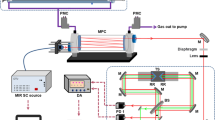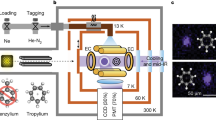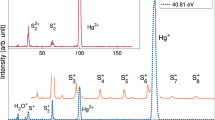Abstract
THE quantitative relations between the spectra of argon and ionised potassium have been for some time a subject of investigation in the Amsterdam Laboratory. The available observations are chiefly due to Schillinger (Wiener Sitz. Ber. 118, 605, 1909), McLennan (Proc. R.S., 100, 182, 1921), and Dik and Zeeman (Proc. Kon. Acad. Amsterdam, 1922, 1923). Schillinger used a spark for the production of the K+ spectrum, McLennan, as well as Dik and Zeeman, the electrodeless discharge. Dik and Zeeman got a rather pure K+ spectrum, because with very intense discharges the arc lines were entirely suppressed, a result at variance with that of other observers. The observations were obtained with a quartz spectrograph. The accuracy is, therefore, not sufficient for a scrutinising analysis, and observations with a grating spectrograph were projected.
This is a preview of subscription content, access via your institution
Access options
Subscribe to this journal
Receive 51 print issues and online access
$199.00 per year
only $3.90 per issue
Buy this article
- Purchase on Springer Link
- Instant access to full article PDF
Prices may be subject to local taxes which are calculated during checkout
Similar content being viewed by others
Author information
Authors and Affiliations
Rights and permissions
About this article
Cite this article
DE BRUIN, T., ZEEMAN, P. On a Connexion between the Spectra of Argon and Ionised Potassium. Nature 115, 116–117 (1925). https://doi.org/10.1038/115116b0
Issue Date:
DOI: https://doi.org/10.1038/115116b0
Comments
By submitting a comment you agree to abide by our Terms and Community Guidelines. If you find something abusive or that does not comply with our terms or guidelines please flag it as inappropriate.



